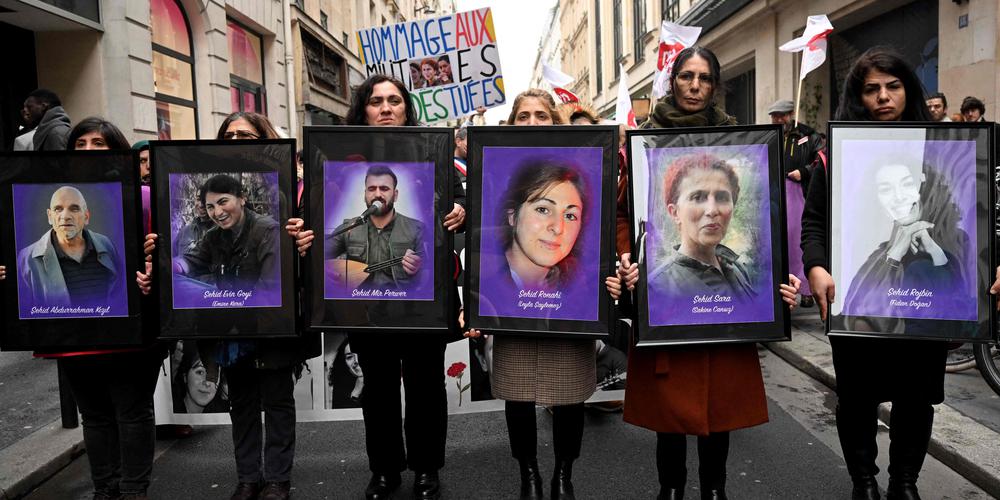Justice for our murdered ComRADES in Paris!
23.12.2023

Just one year ago, on December 23, 2022, three comrades were murdered near CDK-F (Kurdish cultural center), in the heart of Paris. This murder took place almost 10 years to the day after the assassination of three other comrades on January 9, 2013, in the same geographical area. While there is little doubt about the involvement of the Turkish state in these attacks, the real masterminds are still at large. Here’s a look back at the attacks.
On December 23, 2023, for the second time, the Kurdish movement was attacked in Paris. A man, William Malet, was dropped off in a vehicle in front of the CDK-F headquarters, where an important meeting of the women’s movement was to be held to organize the commemoration of the January 9, 2013 attack (a meeting that had fortunately been postponed at the last minute). The attack left four people injured and three dead: Mîr Perwer, who had been forced to take refuge in France following a prison sentence in Turkey for political reasons; Emine Kara (Evîn Goyî), who was one of the main organizers of the women’s movement; and Abdulrahman Kizil, a Kurdish activist familiar with the CDK-F. The killer seemed to have been particularly intent on Emine Kara, whose death he ensured after the first shot hit her.
Despite numerous clues pointing to a politically-motivated attack, the French police immediately described it as a simple “shoot-out” rather than a terror or political attack. And yet the French state is quick to label any act committed by left-wing activists or Muslims as “terrorist”.
This depoliticizing rhetoric was widely picked up by most of the French media, who were quick to characterize the attack as the work of a lone individual acting out of racist ideology – even though numerous disturbing coincidences were apparent from the offset, and it was clear that the murderer, who was dropped off at the scene of the crime by car, appeared to have had accomplices, and therefore did not support the “lone wolf” hypothesis that people were trying to pin on him.
Already 11 years ago, three other comrades had been murdered in Paris: Sakine Cansız (Sara), one of the PKK’s founders and an emblematic figure of the women’s movement; Fidan Doğan (Rojbîn), responsible for the Kurdish movement’s diplomacy in France and an organizer of international solidarity; and Leyla Şaylemez (Ronahî), an activist in the youth movement. The presumed shooter, Ömer Güney, died in custody in December 2016 – a suspicious or planned death (the killer was clearly seriously ill, but no one had been given any information about his state of health) which suspended a trial that had already been 4 years in the making.
The documents and evidence found clearly pointed to the MIT (Turkish secret service). The victims had already been under surveillance for a long time, as the spyware found in their computers could attest, and the alleged shooter had regular links with the Turkish intelligence services.
Although in 2019, under pressure from the families, the investigation was reopened, it remains at a standstill for the time being, with the French government refusing to declassify key secret-defense wiretaps.
While the method of “depoliticization” chosen by the French state after the December 2022 attacks is more subtle than the methodology chosen after 2013, the substance hardly varies. Above all, the French state must not offend the political and economic interests it has forged with Turkey. While European countries’ policy of criminalizing the Kurdish movement is now a well-oiled machine, it should be remembered that no other state on this continent has yet been able to elucidate a single Turkish political crime committed in Turkey, Kurdistan or at home.
In the case of France, this policy of complicity is nothing new: while Turkey has been using France as an operating zone since the 1980s, the authorities have never found anything to object to. And in general, the French state has never seemed to mind that revolutionary or anti-colonial figures could be attacked and assassinated from its soil – and whose success could have jeopardized its interests or imperialist policy. In Paris, Moroccan socialist and opposition figure Mehdi Ben Barka (a member of the Tricontinental) was abducted and disappeared on October 29, 1965; Palestinian PFLP activist Basil al Kubaisi was killed on April 6, 1973; South African anti-apartheid activist Dulcie September was killed on March 29, 1988; and more recently, Tamil Tiger leader Nadarajah Mathinthiran was killed on November 9, 2012.
Faced with this situation, and given that it is specifically the vanguard of women who have been affected, whose role has been and still is essential in the revolutionary process underway in Kurdistan, we call on all friendly organizations and activists to fight Turkish fascism and its accomplices wherever they may be.
Only internationalist solidarity will bring down Turkish fascism! Everywhere, let’s denounce the complicity of states: unity is our strength!
Let’s mobilize so that the real masterminds of the attacks in Paris are brought to justice and so that the impunity of the Turkish state ends!
#SmashTurkishFascism
Riseup4Rojava
